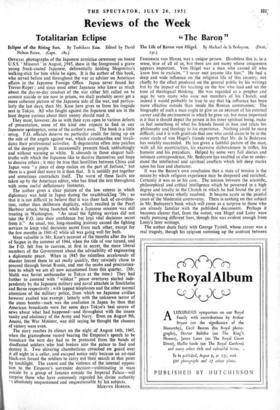Reviews of the Week
Totalitarian Eclipse
OFFICIAL photographs of the Japanese armistice ceremony on board U.S.S. `Missouri' in August, J945, show in the foreground a grave young frock-coated Japanese, deferentially holding Shigemitsu's walking-stick for him while he signs. It is the author of this book, who served before and throughout the war as adviser on American affairs in the Japanese Foreign Office. Japan never found her Trevor-Roper ; and since most other Japanese who knew as much about the day-to-day conduct of the war either felt called on to commit suicide or are now in prison, we shall probably never get a more coherent picture of the Japanese side of the war, and particu- larly the last days, than Mr. Kase here gives us from his ringside seat in Tokyo. All who fought against the Japanese and are in the least degree curious about their enemy should read it.
They must, however, do so with their eyes open to various defects of presentation, some of the kind one expects to find in any Japanese apologetics, some of the author's own. The book is a little smug. F.O. officials deserve no particular credit for lining up on the side of the angels against war, which circumscribes and invali- dates their professional activities. It degenerates often. into patches of the deepest purple. It occasionally presents black unblushingly and without warning as white. It abounds in those elegant half- truths with which the Japanese like to deceive themselves and hope to deceive others ; it may be true that hostilities between China and Japan were " a piece of deep malice on the part of fortune," but there is a good deal more to it than that. It is untidily put together and sometimes contradicts itself. The worst of these faults are taken up by the American editor, who has fitted the text throughOut with .some useful deflationary footnotes.
The author gives a clear picture of the low esteem in which diplomacy was held in Japan during the swashbuckling '30s so that it is not difficult ,to believe that it was sheer lack of co-ordina- tion, rather than deliberate duplicity, which resulted in the Pearl Harbour attack being launched while a Japanese mission was still treating in Washington. " As usual the fighting services did not take the F.O. into their confidence but kept vital decisions secret from it." As usual, too, long-standing jealousy caused the fighting services to keep vital decisions secret from each other, except for the few months in 1941-42 while all was going well for both.
Most valuable is Mr. Kase's account of the months after the loss of Saipan in the summer of 1944, when the tide of war turned, and the F.O. felt free to canvass, at first in secret, the more liberal members of the Government about the advisability of engineering a diplomatic peace. When in 1945 the relentleSs accelerando of disaster forced them to act really quickly, they unwisely chose to proceed through Soviet Russia, and met the snubs and procrastina- tion to which we are all now accustomed from this quarter. (Mr. Malik was Soviet ambassador in Tokyo at the time.) They had further to contend with " wildcat " peace- overtures started inde- pendently by the Japanese military and naval attaches in Stockholm and Berne respectively ; with tapped telephones and the other normal attentions of the military police, from which no Japanese civilian however exalted was exempt ; latterly with the unknown terror of the atom bombs—such was the confusion in Japan by then that American broadcasts were for some days Tokyo's best source of news about what had happened—and throughout with the insane vanity and obstinacy of the Army and Navy. Even on August 9th, Anami, the War Minister, was still saying he thought the chances of victory were even.
The story reaches its climax on the night of August 14th, 1945, when the gramophone record bearing the Emperor's speech to be broadcast the next day had to be protected from the bands of disaffected soldiers who had broken into the palace to find and destroy it. Two shivering chamberlains crouched on guard over it all night in a cellar, and escaped notice only because an air-raid black-out forced the soldiers to carry out their search at that point by torchlight. The extent and the violence of the internal opposi- tion to the. Emperor's surrender decision—culminating in mass suicide by a group of fanatics outside the Imperial Palace—will surprise those who have commonly regarded his divine authority
I absolutely unquestioned and unquestionable by his subjects.
MERVYN HORDER.


































 Previous page
Previous page